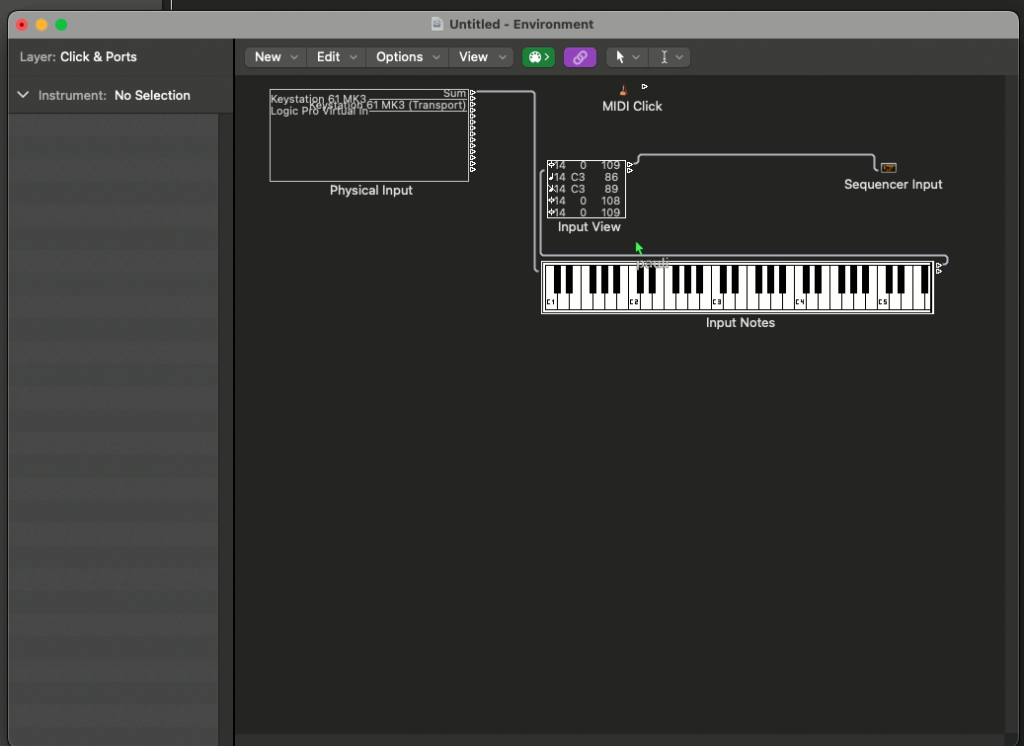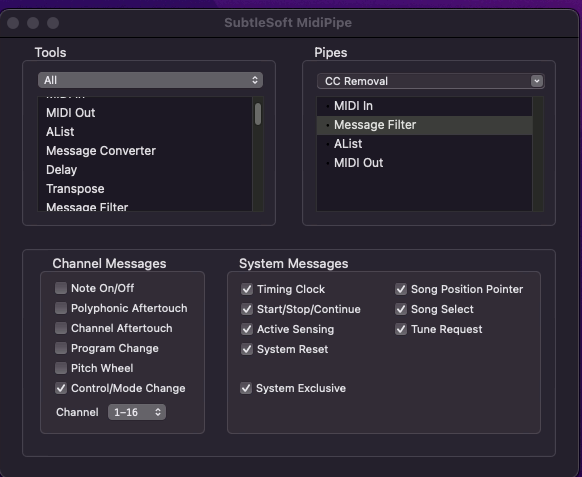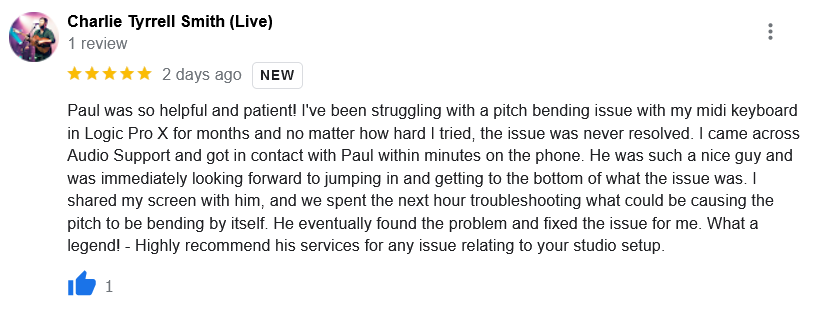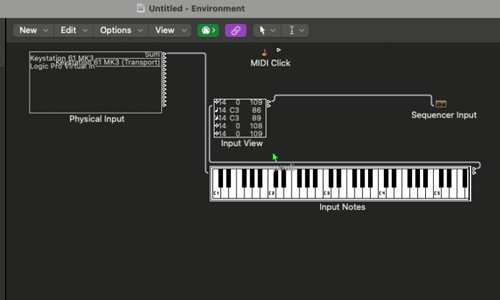Hi Paul. I have a problem with Logic Pro. I get random pitch changes on my synths when I’m playing my MIDI keyboard. I can see the pitch wheel move on the synth. It jumps to a new position and stays there until I reset it with the mouse. I don’t know why this is happening. I’ve tried removing plugins and reinstalling both my Mac operating system and Logic Pro but the problem remains. Can you help?
Charlie
Paul from Audio Support explains how he solved this problem:
I received the above enquiry from Charlie and was able to schedule him into the diary for the same afternoon. At the agreed time, we spoke via WhatsApp and set up a screen-sharing connection via AnyDesk.
Once we were connected, I asked Charlie to show me the problem occurring. We set up a new Logic Pro project with a single instance of Serum. He played in some MIDI notes from his keyboard and almost immediately the pitch wheel on Serum jumped by about fifty percent and stayed in the raised position. An unusual problem.
The first place to investigate issues with MIDI in Logic is the Environment. Specifically, the Clicks and Ports page where incoming MIDI data can be viewed in a Monitor module. We opened the environment and could see that there was pitch bend data being sent into Logic. We changed the monitor routing to confirm the exact source and could see that the pitch data was coming from the MIDI IN port of his M-Audio Keystation 61 MK3.

In the above image we can see information being sent to MIDI Channel 14, CC 0 (pitch wheel) at value 108 or 109. This was the cause of the pitch jumps.
Charlie confirmed he wasn’t touching the pitch wheel and we noticed more data was sent when he wasn’t touching the keyboard at all.
We had now identified the problem as the M-Audio Keyboard and a bit of quick Googling told us that Charlie was not the only person who was suffering from this issue:
https://www.soundonsound.com/forum/viewtopic.php?t=78822&p=772384
It looked like this pitch wheel issue was a hardware problem that was common with M-Audio Keyboards. I’ve encountered a lot of problematic M-Audio equipment in the past, so wasn’t surprised by this.
I explained that Charlie had three options.
- Replace the faulty keyboard
- Repair the faulty keyboard
- Set up a software block to stop the unwanted data being sent to Logic
The budget cost of the Keystation meant that repair wasn’t an option and that replacement was probably the solution long-term.
In order to keep Charlie working for the meantime, I spent the next part of the session setting up an instance of MIDIPipe to block the pitch data. The keyboard would still be sending the MIDI, but it wouldn’t be seen by Logic Pro.

MIDIPipe is an amazingly useful piece of free software and can be downloaded from here:
http://www.subtlesoft.square7.net/MidiPipe.html
The pipe setup was very straightforward:
- MIDI IN – Keystation 61
- Message Filter – Remove all Pitch Wheel information
- A List – To monitor the data post-filter
- MIDI OUT – A virtual MIDI out connection to Logic Pro
In Logic Pro, we set the MIDI input preferences to ignore all the MIDI data being sent directly from the keyboard and avoid doubling the data stream. We tested in Logic and confirmed all pitch wheel information being sent from the M-Audio keyboard was now ignored.
Not the perfect solution, as Charlie could now no longer manually play pitch bends in his MIDI recordings. However, he was able to continue using Logic Pro without having to buy a new keyboard and was happy with the workaround we had put in place.
At the end of the session, Charlie was kind enough to leave me a nice review:

About the Author

I’m the owner and lead technician for Audio Support, a small company based in London, UK that connects remotely with clients worldwide to help them with their music technology issues. I’ve run Audio Support since 2005 and in that time I’ve seen and solved thousands of recording studio problems.
Outside of Audio Support, I run music workshops at a local school, play bass in a 90s tribute function band and perform modular synth jams with friends on Twitch.
Get support for similar problems:
More Logic Pro problems solved
- Advanced Logic Pro MIDI Questions Answered
- MIDI Problems When Connecting a Yamaha Montage 8 to Logic Pro – Solved
- Copying Audio Regions Between Projects in Logic Pro 11.1.2
- Audio Files Missing in Logic Pro 11.1 on M3 Mac
- Question Answered – How to Quick-Punch-Out in Logic Pro?
- Creating a custom Logic Pro MIDI environment for Novation Launch Control XL
- Repairing Native Instruments Komplete 15 on Mac M2
- Troubleshooting Logic Pro 11.1.2 Plug-in Errors on M2 Mac
- Routing MIDI from Guitar Pro 8 to Logic Pro 10.4.4
- Troubleshooting CPU Overload in Logic Pro
- Allowing PreSonus Drivers in OSX Security Preferences
- Moving Sample Libraries to Improve Logic Pro Loading Speeds
- Diagnosing Slow Loading Problems in Logic Pro
- Visiting a Guitarist to Help With His Logic Pro Recording Setup
- Lesson on Using Automation in Logic Pro
- Komplete Kontrol Missing Presets in Logic Pro
- Arturia Keylab Essential 61 MIDI control surface options in Logic Pro
- Creating a Custom Project Template for Guitar Recording in Logic Pro
- Audio Unit Crashes in Sonoma 14.4.1 – Resolved by 14.5 Update?
- Audio Recording Delayed in Logic Pro – Solved
- Three Methods to Improve Logic Pro’s Performance on an Older iMac
- Sample Rate Problems Using an Audient ID24 and ASP800 in Logic Pro – Solved
- Pitch Changes Randomly Occurring on Logic Pro Synths – Solved
- M-Audio Keystation 88 II not sending MIDI to Logic Pro – Solved
- Problems setting up an SPL Transient Designer as an I/O effect in Logic Pro – Solved
- Logic Pro Disk Overload on Mac Mini M2 – Solved
- IK Multimedia AXE I/O Audio Interface Not Working with Logic Pro X – Solved
- Building Custom Vocal Distortion Presets in Logic Pro X
- Evolve Mutations Sample Library Missing in Kontakt – Solved
- Logic Pro playhead stuck at beginning of song
- No sound from certain MIDI regions when assigning sounds to Native Instruments Kontakt
- Restoring slowed down audio regions in Logic Pro
- Installing Spitfire and Toontrack plugins
- Logic Pro X not opening – ‘Bundle Error’ – solved
- AKAI MPK249 Pitch wheel problem fixed
- Installing Antares Auto-Tune and Vocodist
- Locating missing files in Kontakt
- Logic Pro solo function not working with an analogue summing mixer
- Diagnosing problems with USB hubs
- Transferring MIDI song files from Logic to an FA06 keyboard
- Diagnosing noise problems with Yamaha FX550 effects box
- Installing Antares Auto-Tune Pro X
- Diagnosing issues with noise in vintage effects boxes
